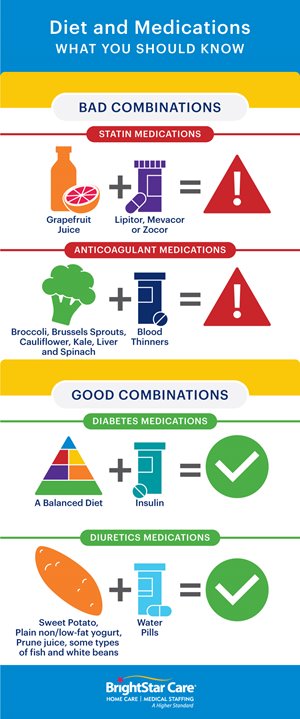Managing a senior loved one’s medications and diet is a challenge many family caregivers face daily. Many clients are surprised to learn that certain otherwise healthy foods can interfere with the efficacy of vital medications.
Foods such as grapefruit juice, broccoli, or kale can impact the effectiveness of some drugs for heart and kidney diseases. In fact, some foods can cause serious adverse reactions when seniors are taking certain medications. Some of the more common medications at risk for reaction include statins, anticoagulants, diabetes medications, and diuretics.
4 Common Medications Affected by Diet
 Statins
Statins
Grapefruit juice is known to have a negative effect on how statins work. Normally, statins are broken down in the body by an enzyme that reduces the levels of the medication as it passes into the bloodstream. However, grapefruit juice contains compounds that can make the dose toxic. Some statins are more susceptible to interaction with grapefruit juice than others, including:
-
Atorvastatin (Lipitor)
-
Lovastatin (Mevacor)
-
Simvastatin (Zocor)
If your loved one enjoys grapefruit juice, talk to their doctor or pharmacist about whether they can switch to an alternative medication or if they should avoid the juice entirely while continuing to take one of the above medications.
Anticoagulants
The effectiveness of certain anticoagulants, or blood thinners, such as warfarin (Coumadin), can be reduced by foods that are rich in vitamin K, which plays an essential role in the blood’s natural clotting process.
If your loved one eats large amounts of foods that are rich in vitamin K, they may be more likely to experience a reduction in the effectiveness of the anticoagulent and therefore be at greater risk of blood clots. Some foods that have high levels of vitamin K include:
-
Broccoli
-
Brussels sprouts
-
Cauliflower
-
Kale
-
Liver
-
Spinach
However, this doesn’t mean your loved one needs to completely cut out these foods just because they’re taking an anticoagulant. What’s most important is to eat foods high in vitamin K at levels consistent with how much they’ve normally eaten before—not more or less. If your loved one’s intake of vitamin K-containing foods changes significantly, be sure to let your prescriber know.
When one of our clients is on warfarin or another type of coagulant, we may be involved in the monitoring of their blood periodically to make sure their medication levels are where they need to be. If we notice a change, we’ll ask the client or their loved ones if there’s been any changes to their diet recently that could affect how well the medicine works.
Diabetes Medications
Overweight or obese clients on medications for Type 2 diabetes often are instructed to lose weight as part of their treatment plans. But some diabetes medications actually can influence weight, which can affect how well the medications work.
Insulin is a common injectable medication prescribed for diabetes. Along with the diabetes medications taken by mouth (orally), insulin also helps lower blood sugar. Both of these types of medications can impact weight, in some instances adding pounds, which in turn can impact blood sugar control. It’s important to work with your healthcare team to keep your weight, your blood sugar, and your medication regimen in balance.
Diuretics
Diuretics, also known as water pills, help your loved one’s body better get rid of salt and water. Some forms of these medications also can cause your loved one to lose potassium. Low potassium levels in the blood can lead to a number of problems, such as:
-
Weakness or fatigue
-
Constipation
-
Heart palpitations
-
Abnormal heart rhythms
Seniors who are on diuretics have to make sure they get enough potassium as part of a healthy diet. Most people think of bananas as the go-to source for potassium, but they are high in carbs, which is unhealthy for people with diabetes. Other foods that are high in potassium include:
-
Sweet potatoes
-
Plain nonfat or low-fat yogurt
-
Prune juice
-
Some types of fish, such as halibut and tuna
-
White beans
How a Professional Caregiver Can Reduce the Risk
Our BrightStar Care Professional Care Team plays an active role in medication safety for clients. As part of our accreditation by the Joint Commission, we follow their National Patient Safety Goals, one of which is medication safety. During our first visit with each new client, one of our registered nurses reviews the client’s medications to check for harmful interactions. We repeat this process every 60 to 90 days, depending on the client’s level of care. We can supervise your loved one to make sure they’re taking their medications properly or, in most states, handle the administration of those medications.
Related reading: How to avoid dangerous drug interactions
Our nurses can help educate the client and their family about early warning signs of possible interactions. If we see a client losing weight without trying or other signs of trouble, we can help narrow down the problem to see if it’s related to their medications and what they’re eating, as well as whether it’s time to contact their doctor or pharmacist to adjust the medication.
There’s more to taking medications than taking the right pill at the right time, especially for older people who need home care. Our trained nurses can help watch for telltale signs that your loved one’s diet may be affecting how well their medicines work.
To learn more about in-home care services for your loved one, call us 24/7 at (949) 837-7000.

